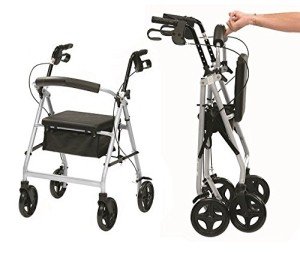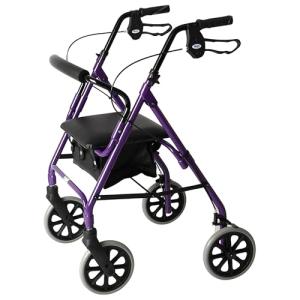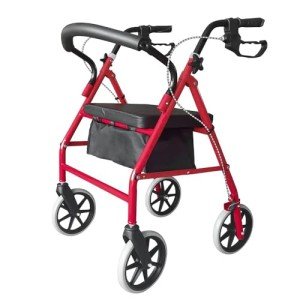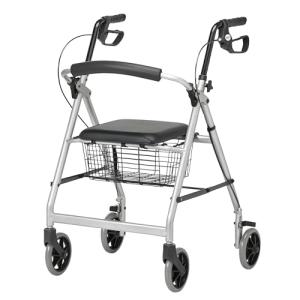As the population ages, the demand for mobility aids has significantly increased. One of the most practical solutions for maintaining independence while promoting safety and stability is the lightweight folding four-wheel walker with a seat. This mobility aid combines functionality with convenience, making it an essential tool for many individuals, particularly the elderly or those with mobility impairments.
Understanding Lightweight Folding Four-Wheel Walkers
A lightweight folding four-wheel walker is designed to support people who need assistance with balance and mobility. Its construction includes four wheels, a sturdy frame, and a comfortable seat. This type of walker is user-friendly, providing an ergonomic solution that empowers users to move safely while having a designated resting area.
Key Features of a Four-Wheel Walker
-
Lightweight Construction: Typically made from materials like aluminum, these walkers are easy to maneuver, transport, and store.
-
Folding Design: The ability to fold the walker allows for easy storage and transport. Users can take it in their cars during outings, ensuring they have support wherever they go.
-
Four-Wheel Stability: Unlike standard walkers with two legs, a four-wheel design provides enhanced stability, making it suitable for various terrains, both indoors and outdoors.
-
Built-in Seat: A fundamental feature that sets these walkers apart; the seat allows users to take breaks as needed, reducing fatigue during outings.
-
Adjustable Handles: Handlebars that can be adjusted for height cater to different user needs, ensuring optimal ergonomics and comfort.
-
Brakes: Most models come equipped with hand brakes that provide added safety by allowing the user to stop the walker securely.
-
Storage Options: Many walkers include a storage basket or pouch, enabling users to carry personal items conveniently.
Why Choose a Four-Wheel Walker with a Seat?
There are several reasons why a lightweight folding four-wheel walker with a seat is an excellent choice for individuals seeking mobility support:
-
Enhanced Mobility: These walkers allow individuals to cover greater distances than they could unaided, promoting activity and engagement with the community.
-
Improved Safety: They provide stability, reducing the risk of falls and injuries, especially on uneven surfaces.
-
Convenience: The ability to take a seat means users can rest whenever necessary, preventing fatigue during longer outings.
-
Independence: This mobility aid empowers users to maintain their independence, allowing them to run errands, visit friends, or engage in social activities without relying entirely on others for assistance.
Choosing the Right Walker
Selecting the ideal lightweight folding four-wheel walker with a seat involves considering the user’s specific needs. Here are some important points to keep in mind while shopping:
- Weight Limit: Ensure the walker can support the user's weight.
- Seat Height: Check the height of the seat to ensure it is comfortable and accessible.
- Wheel Size: Larger wheels can handle rough terrain better, while smaller wheels are typically better for indoor use.
- Braking System: Look for walkers with effective braking systems for maximum safety.
- Ease of Use: Evaluate how user-friendly the walker is, including how simple it is to fold and unfold.
FAQs
Q1: How much do lightweight folding four-wheel walkers typically cost?
A: Prices can range from £100 to £300 depending on the brand, features, and materials used.
Q2: Are these walkers suitable for outdoor use?
A: Yes, lightweight folding four-wheel walkers are designed for both indoor and outdoor use. However, users should consider the wheel size and terrain when venturing onto rough surfaces.
Q3: Can you use a four-wheel walker as a regular walking aid?
A: Yes, four-wheel walkers are designed to assist with balance and mobility just like traditional walkers but offer additional benefits such as a seat and better maneuverability.
Q4: How do I maintain a four-wheel walker?
A: Regular maintenance is necessary to ensure safety. Users should check the brakes, clean the wheels, and inspect the frame for any signs of wear.
Q5: Are there any restrictions on using a four-wheel walker?
A: Users should follow the manufacturer's guidelines regarding the weight limit and terrain suitability and consult a healthcare professional if they have any concerns about using a walker.
A lightweight folding four-wheel walker with a seat is not just a mobility device; it is a tool that enhances quality of life. It provides users a sense of freedom, security, and independence, allowing them to connect with the world around them. By understanding the features and benefits of these walkers and taking the time to choose the right one, users can significantly improve their daily activities and regain confidence in their mobility. As assistive technology continues to grow, products like the four-wheel walker with a seat encourage users to maintain an active and fulfilling lifestyle well into their later years.






